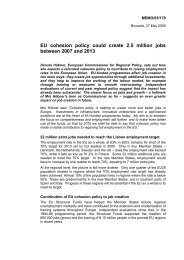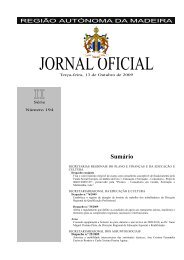Industrial Relations in Europe 2012 - European Commission - Europa
Industrial Relations in Europe 2012 - European Commission - Europa
Industrial Relations in Europe 2012 - European Commission - Europa
You also want an ePaper? Increase the reach of your titles
YUMPU automatically turns print PDFs into web optimized ePapers that Google loves.
would appear that the funds were a battleground on which the government sought to <strong>in</strong>fluence wage<br />
policy. Kjellberg (2009) notes that <strong>in</strong>creases <strong>in</strong> the fees of union unemployment funds, aimed at<br />
pressur<strong>in</strong>g unions to moderate their wage claims, resulted <strong>in</strong> significant losses <strong>in</strong> the membership of<br />
trade unions and of the funds: “In 2007, union unemployment funds lost almost twice as many<br />
members as the unions did. In a period of one year, union density decl<strong>in</strong>ed by 4 percentage po<strong>in</strong>ts,<br />
which is unique <strong>in</strong> modern Swedish history and remarkable also from an <strong>in</strong>ternational perspective<br />
… by chang<strong>in</strong>g the Swedish Ghent system the government caused a fall <strong>in</strong> union density with no<br />
parallel <strong>in</strong> modern Swedish history.”<br />
6.4 Ma<strong>in</strong> trends <strong>in</strong> social partner <strong>in</strong>volvement <strong>in</strong> unemployment benefit<br />
The context with<strong>in</strong> which unemployment benefit systems operate has changed radically s<strong>in</strong>ce many<br />
of these systems were first created. Clasen and Clegg (2011) note that many of these benefit<br />
systems were designed <strong>in</strong> economies that were predom<strong>in</strong>antly <strong>in</strong>dustrial and characterised by<br />
employment relationships that were largely standardised and followed a stable career path. Over the<br />
past 20 years or so, this scenario has changed significantly, as the result of a move towards<br />
predom<strong>in</strong>antly service-based economies and demand for more flexibility <strong>in</strong> terms of wages and<br />
employment terms and conditions. These types of changes <strong>in</strong> circumstance and context have had an<br />
<strong>in</strong>fluence on the level and <strong>in</strong>fluence of the social partners, although it would seem that the degree of<br />
change depends to a large extent on the national context.<br />
Schaapman and van het Kaar (2007) note that social partner <strong>in</strong>fluence is likely to be stable and<br />
undisputed <strong>in</strong> countries with a strong and cont<strong>in</strong>u<strong>in</strong>g tradition of social partnership (such as F<strong>in</strong>land<br />
and Sweden), where there is a strong tradition of state leadership <strong>in</strong> social security (such as <strong>in</strong><br />
Hungary), or where there is little social partner <strong>in</strong>fluence <strong>in</strong> the area of social security, and no<br />
debate on chang<strong>in</strong>g the situation (eg <strong>in</strong> the UK). In countries such as Slovenia and Malta, although<br />
<strong>in</strong>fluence is stable, the social partners are demand<strong>in</strong>g more <strong>in</strong>fluence <strong>in</strong> the area of social benefits.<br />
Institutional changes are deemed to have had a negative impact on the <strong>in</strong>fluence of the social<br />
partners on unemployment benefit systems <strong>in</strong> some countries, such as Denmark and Germany.<br />
Further, lack of consensus among the social partners themselves <strong>in</strong> some countries, such as France,<br />
was also identified to have a negative impact on social partner <strong>in</strong>fluence <strong>in</strong> the area of social<br />
benefits.<br />
Some trends can also have positive <strong>in</strong>fluences on social partner <strong>in</strong>volvement and <strong>in</strong>fluence. These<br />
<strong>in</strong>clude <strong>in</strong>stitutional changes to the advantage of the social partners, and proactive social partner<br />
approaches. This has been the case <strong>in</strong> Ireland where, although the welfare system is not generous,<br />
social partner <strong>in</strong>fluence has <strong>in</strong>creased s<strong>in</strong>ce 1987 due to the growth of social partnership (although<br />
this has now come under severe pressure as a result of the f<strong>in</strong>ancial crisis). On occasion, trade union<br />
action has resulted <strong>in</strong> policy <strong>in</strong>fluence – this has been the case <strong>in</strong> recent years <strong>in</strong> countries such as<br />
Austria, the Netherlands and Spa<strong>in</strong>.<br />
Most recently, the pressures affect<strong>in</strong>g the operation of unemployment benefit systems are likely to<br />
have been exacerbated by the crisis, as governments implement austerity measures and cost-cutt<strong>in</strong>g<br />
plans (see also chapter 4 of this report). Social partners are be<strong>in</strong>g <strong>in</strong>volved to a greater or lesser<br />
extent <strong>in</strong> this process – for more details, see the section below on the effects of the crisis.<br />
Another issue relevant to the formulation of unemployment benefit policy and the social partners’<br />
<strong>in</strong>volvement <strong>in</strong> this is that of the reservation wage – the lowest level of <strong>in</strong>come that would be<br />
237

















